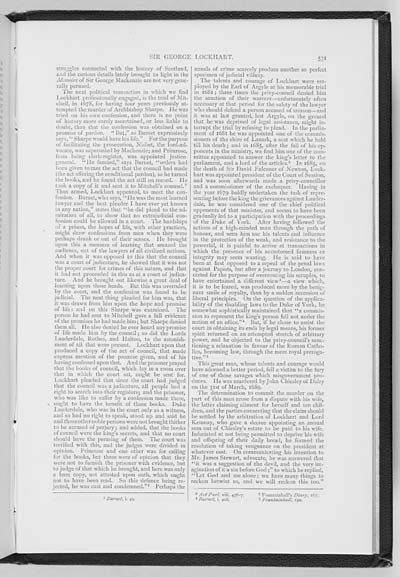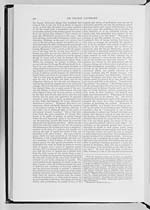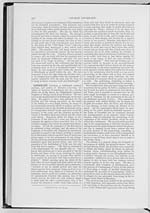531
struggles connected with the history of Scotland,
and the curious details lately brought to light in the
Memoirs of Sir George Mackenzie are not very gene-
rally perused.
The next political transaction in which we find
Lockhart professionally engaged, is the trial of Mit-
chell, in 1678, for having four years previously at-
tempted the murder of Archbishop Sharpe. He was
tried on his own confession, and there is no point
of history more surely ascertained, or less liable to
doubt, than that the confession was obtained on a
promise of pardon. " But," as Burnet expressively
says," Sharpe would have his life." For the purpose
of facilitating the prosecution, Nisbet, the lord-ad-
vocate, was superseded by Mackenzie; and Primrose,
from being clerk-register, was appointed justice-
general. "He fancied," says Burnet, "orders had
been given to raze the act that the council had made
(the act offering the conditional pardon), so he turned
the books, and he found the act still on record. He
took a copy of it and sent it to Mitchell's counsel."
Thus armed, Lockhart appeared, to meet the con-
fession. Burnet, who says,'' He was the most learned
lawyer and the best pleader I have ever yet known
in any nation," states that "he did plead to the ad-
miration of all, to show that no extrajudicial con-
fession could be allowed in a court. The hardships
of a prison, the hopes of life, with other practices,
might draw confessions from men when they were
perhaps drunk or out of their senses. He brought
upon this a measure of learning that amazed the
audience, out of the lawyers of all civilized nations.
And when it was opposed to this that the council
was a court of judicature, he showed that it was not
the proper court for crimes of this nature, and that
it had not proceeded in this as at a court of judica-
ture. And he brought out likewise a great deal of
learning upon those heads. But this was overruled
by the court, and the confession was found to be
judicial. The next thing pleaded for him was, that
it was drawn from him upon the hope and promise
of life: and on this Sharpe was examined. The
person he had sent to Mitchell gave a full evidence
of the promises he had made him; but Sharpe denied
them all. He also denied he ever heard any promise
of life made him by the council; so did the Lords
Lauderdale, Rothes, and Halton, to the astonish-
ment of all that were present. Lockhart upon that
produced a copy of the act of council, that made
express mention of the promise given, and of his
having confessed upon that. And the prisoner prayed
that the books of council, which lay in a room over
that in which the court sat, might be sent for.
Lockhart pleaded that since the court had judged
that the council was a judicature, all people had a
right to search into their registers; and the prisoner,
who was like to suffer by a confession made there,
ought to have the benefit of those books. Duke
Lauderdale, who was in the court only as a witness,
and so had no right to speak, stood up and said he
and those other noble persons were not brought thither
to be accused of perjury; and added, that the books
of council were the king's secrets, and that no court
should have the perusing of them. The court was
terrified with this, and the judges were divided in
opinion. Primrose and one other was for calling
for the books, but three were of opinion that they
were not to furnish the prisoner with evidence, but
to judge of that which he brought, and here was only
a bare copy, not attested upon oath, which ought
not to have been read. So this defence being re-
jected, he was cast and condemned."1 Perhaps the
1 Burnet, i. 41.
annals of crime scarcely produce another so perfect
specimen of judicial villany.
The talents and courage of Lockhart were em-
ployed by the Earl of Argyle at his memorable trial
in 1681; three times the privy-council denied him
the sanction of their warrant�unfortunately often
necessary at that period for the safety of the lawyer
who should defend a person accused of treason�and
it was at last granted, lest Argyle, on the ground
that he was deprived of legal assistance, might in-
terrupt the trial by refusing to plead. In the parlia-
ment of 1681 he was appointed one of the commis-
sioners of the shire of Lanark, a seat which he held
till his death; and in 1685, after the fall of his op-
ponents in the ministry, we find him one of the com-
mittee appointed to answer the king's letter to the
parliament, and a lord of the articles.2 In 1685, on
the death of Sir David Falconer of Newton, Lock-
hart was appointed president of the Court of Session,
and was soon afterwards made a privy-councillor
and a commissioner of the exchequer. Having in
the year 1679 boldly undertaken the task of repre-
senting before the king the grievances against Lauder-
dale, he was considered one of the chief political
opponents of that minister, and seems to have been
gradually led to a participation with the proceedings
of the Duke of York. After having followed the
actions of a high-minded man through the path of
honour, and seen him use his talents and influence
in the protection of the weak, and resistance to the
powerful, it is painful to arrive at transactions in
which the presence of his accustomed firmness or
integrity may seem wanting. He is said to have
been at first opposed to a repeal of the penal laws
against Papists, but after a journey to London, con-
certed for the purpose of overcoming his scruples, to
have entertained a different view3�a view which,
it is to be feared, was produced more by the benig-
nant smile of royalty, than by a sudden accession of
liberal principles. On the question of the applica-
bility of the disabling laws to the Duke of York, he
somewhat sophistically maintained that "a commis-
sion to represent the king's person fell not under the
notion of an office."4 But, if he chose to assist the
court in obtaining its ends by legal means, his former
spirit returned on an attempted stretch of arbitrary
power, and he objected to the privy-council's sanc-
tioning a relaxation in favour of the Roman Catho-
lics, becoming law, through the mere royal preroga-
tive."5
This great man, whose talents and courage would
have adorned a better period, fell a victim to the fury
of one of those savages which misgovernment pro-
duces. He was murdered by John Chiesley of Dairy
on the 31st of March, 1689.
The determination to commit the murder on the
part of this man arose from a dispute with his wife,
the latter claiming aliment for herself and ten chil-
dren, and the parties consenting that the claim should
be settled by the arbitration of Lockhart and Lord
Kemnay, who gave a decree appointing an annual
sum out of Chiesley's estate to be paid to his wife.
Infuriated at not being permitted to deprive his wife
and offspring of their daily bread, he formed the
resolution of taking vengeance on the president at
whatever cost. On communicating his intention to
Mr. James Stewart, advocate, he was answered that
"it was a suggestion of the devil, and the very im-
agination of it a sin before God;" to which he replied,
"Let God and me alone; we have many things to
reckon betwixt us, and we will reckon this too."
2 Act Parl. viii. 456-7.
4 Burnet, i. 408.
3 Fountainhall's Diary, 167.
5 Fountainhall, 192.

![]() Universal Viewer |
Universal Viewer | ![]() Mirador |
Large image | Transcription
Mirador |
Large image | Transcription
![]()

